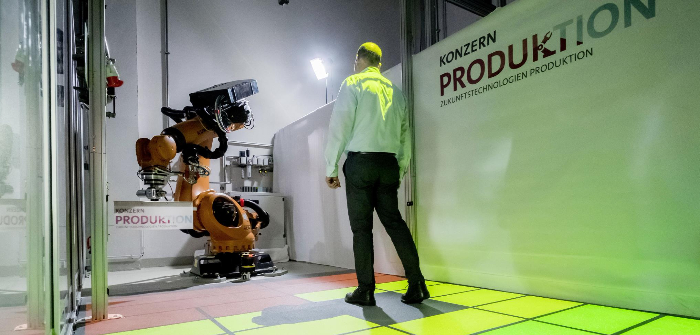VW has developed a unique innovation that enables humans to work safely in the immediate vicinity of an industrial robot without the need for separation by a fixed safety barrier by using a laser safety scanner that reliably detects any employee movements.
A high-level control system coordinates the movements of the human worker and the robot, slowing and stopping the robot as soon as the worker enters the relevant safety zones.
Dr Martin Gallinger, who is responsible for further development of robot applications in Volkswagen Group production, explained why the dynamic safety zones are so important for production in future: “Everyone is now talking about human-robot cooperation. To date, we have been concerned chiefly with cooperation with lightweight robots that weigh significantly less and carry lighter loads.
“Now we want to make industrial robots fit for cooperation with people. They can relieve the burden on human workers as large industrial robots can lift much heavier parts and pass them to people.”
For test purposes, Gallinger’s team has developed a prototype fit for use in series production together with Volkswagen’s partners Kuka, Keyence Deutschland and Fraunhofer IFF. Color coding gives the employee a clear and simple indication of the area where they can work without any impact on the robot (green).
The safety zones are dynamically adjusted in response to the movement of the robot. For example, if the robot is working in the background, far away from the position of the human worker, the green, yellow and red zones are moved accordingly.
If the human worker is in the yellow zone, the movement of the robot is severely decelerated, and it is even stopped if the human worker is in the red zone. This means that the employees concerned are totally safe and have complete clarity concerning the safety zone at all times.
The prototype that has been developed confirms the technical feasibility of a new form of cooperation and an entirely new safety concept.
“In the next step, we will be intensively testing and optimizing the prototype together with our project partners, health and safety experts, and production employees. We intend to use their feedback to develop the system together to the point where it is fully fit for use in series production,” Gallinger added.


